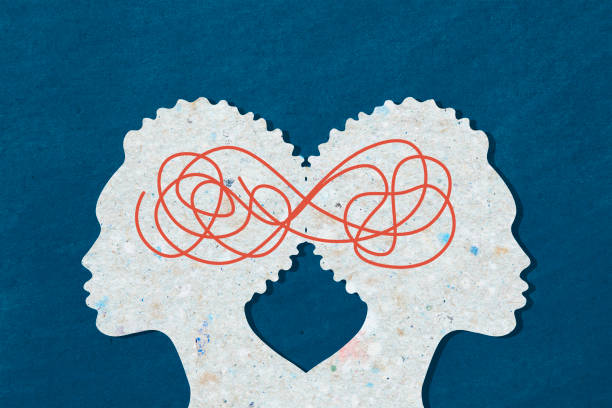Living with bipolar disorder can feel like having no control over your own mind, especially when you hear about an episode from someone else’s perspective. This is a reality for many people dealing with a bipolar disorder, which involves extreme mood swings between manic highs and depressive lows. Things can get even more complicated when a person already has a strong, assertive personality. How much grace should we offer someone with a bipolar disorder? Can we set healthy boundaries? How can we tell the difference between their personality and their mental health issues? To answer these questions, let’s first take a look at what bipolar disorder actually is. There are two main types: Bipolar 1 and Bipolar 2.
Bipolar 1 involves full manic episodes where a person feels euphoric, has a lot of energy, and acts impulsively. These episodes can last at least seven days and may require hospitalization. Symptoms can include a lack of sleep, racing thoughts, and risky behavior, and in some cases, psychotic symptoms can occur. This can severely impact a person’s life
Bipolar 2 on the other hand, involves long lasting depressive episodes and hypomania, which is a milder form of mania. Hypomania lasts about four days and doesn’t cause major disruption or require hospitalization. Even though Bipolar 2 may not be as intense as Bipolar 1, it still brings on periods of depression that can significantly affect daily life. Despite treatment options like medication and therapy, bipolar disorder is tough to fully manage and people can still struggle with mood swings, impulsive behavior, and emotional ups and downs. This can complicate relationships with family, friends, and coworkers.
Now, let’s consider what happens when someone with bipolar disorder already has a strong personality. Strong personalities tend to come with traits like confidence, assertiveness, and decisiveness, qualities that can be great in many situations. However, when these traits combine with the mood swings of bipolar disorder, things can get tense and confusing. For family and friends, it can be difficult to figure out whether the behavior is coming from the person’s personality or from the disorder itself. When bipolar disorder enters the picture, these traits can become amplified during manic episodes, making it even harder to distinguish between the two.
A common misconception is that treatment will “normalize” a person’s personality. While medication does help stabilize mood and manage symptoms, the person’s personality traits usually stay the same. This means that even if the extreme highs and lows of bipolar disorder become less noticeable with treatment, the person may still show behaviors that seem impulsive, intense, or challenging during certain episodes.
This leads us to an important question: how do we tell the difference between behaviors caused by bipolar disorder and those that are just part of someone’s strong personality? It’s not always easy, but there are a few things to consider. Bipolar behaviors usually follow a pattern, with manic and depressive episodes happening over time. If the extreme behavior lines up with the person’s typical mood swings, it’s probably related to the disorder but a strong personality trait tends to stay the same over time. Research indicates that while bipolar disorder can amplify certain personality traits during manic or depressive episodes, it doesn’t alter the person’s core personality. According to an article from PubMed Central treatments for bipolar disorder, such as medication and therapy, help stabilize mood but do not “normalize” a person’s inherent personality. In another study, a person’s traits may seem more evident during a manic episode, but this behavior is a result of the disorder rather than their true personality. This distinction can help family and friends understand that the changes they observe may not be permanent or indicative of the person’s core identity, but rather a temporary distortion caused by the illness as well.
Manic episodes are intense and disruptive, often leading to impulsive decisions, risky behavior, or a distorted sense of reality. A person with a strong personality might be assertive or dominant, but their behavior won’t typically cause the same level of disruption. If someone is getting treatment for bipolar disorder, it’s helpful to see if their behavior changes when they’re stable or during an episode. If they act differently during a manic episode, it may be a sign of the disorder, not their normal personality.
When someone is living with bipolar disorder, they often can’t control their mood shifts during manic or depressive episodes. Offering grace means recognizing that these changes are part of the disorder, but still maintaining healthy boundaries. For instance, during a manic episode, someone might act impulsively or say things that are hurtful. These actions are more likely the result of the disorder than the person’s true character. Offering grace in this case means not rushing to judgment, showing empathy, but also addressing the behavior in a constructive way.
Even while offering grace, it’s important to establish and maintain boundaries. This can be challenging when someone has both a strong personality and a mental health condition, but it’s necessary for everyone’s well being. You need to find a balance between understanding their behavior might be influenced by bipolar disorder and recognizing that healthy boundaries are needed to protect everyone involved.
Accountability is just as important as grace. Even though bipolar disorder influences behavior, we still need to hold people accountable for their actions. This is tricky because some behaviors might stem from the disorder. However, harmful actions should still be addressed. The key is to evaluate the behavior in the context of the illness, but also to address it directly.
Navigating life with someone who has bipolar disorder and a strong personality requires balancing grace, understanding, and accountability. Grace involves recognizing that a person may not always have control over their behavior during manic or depressive episodes, but it also means setting healthy boundaries to protect everyone. By understanding bipolar disorder, along with the difference between personality traits and mental health symptoms, we can develop more compassionate relationships while still holding people accountable. Through patience, education, and empathy, we can support those living with bipolar disorder in ways that are both caring and effective.










